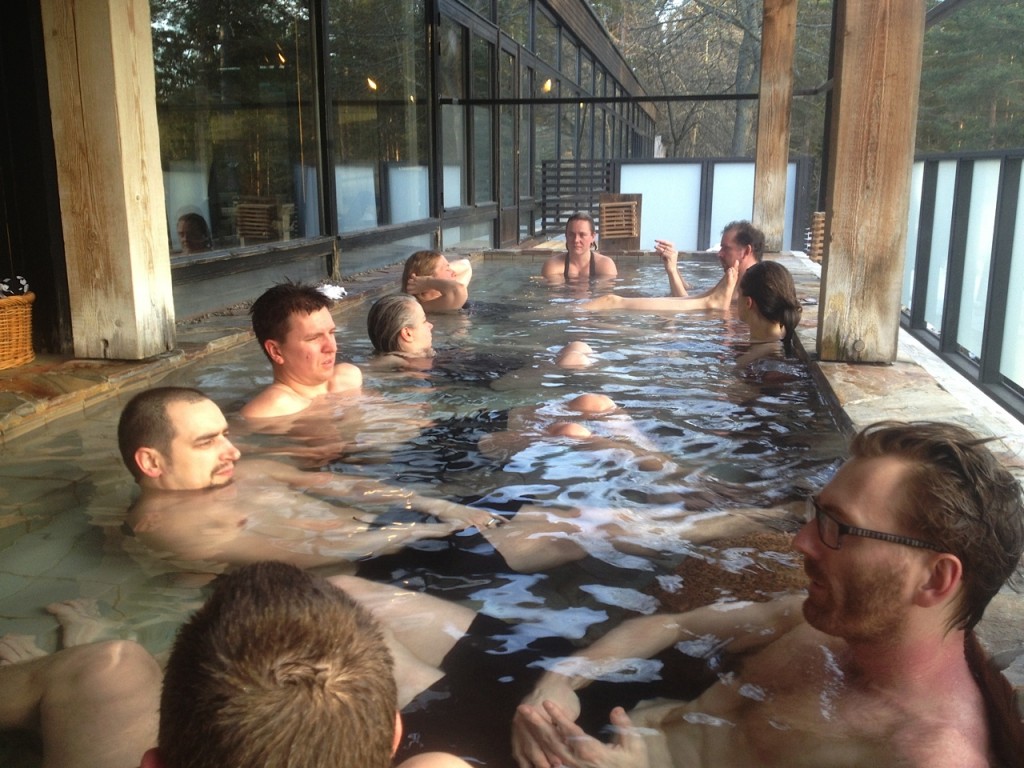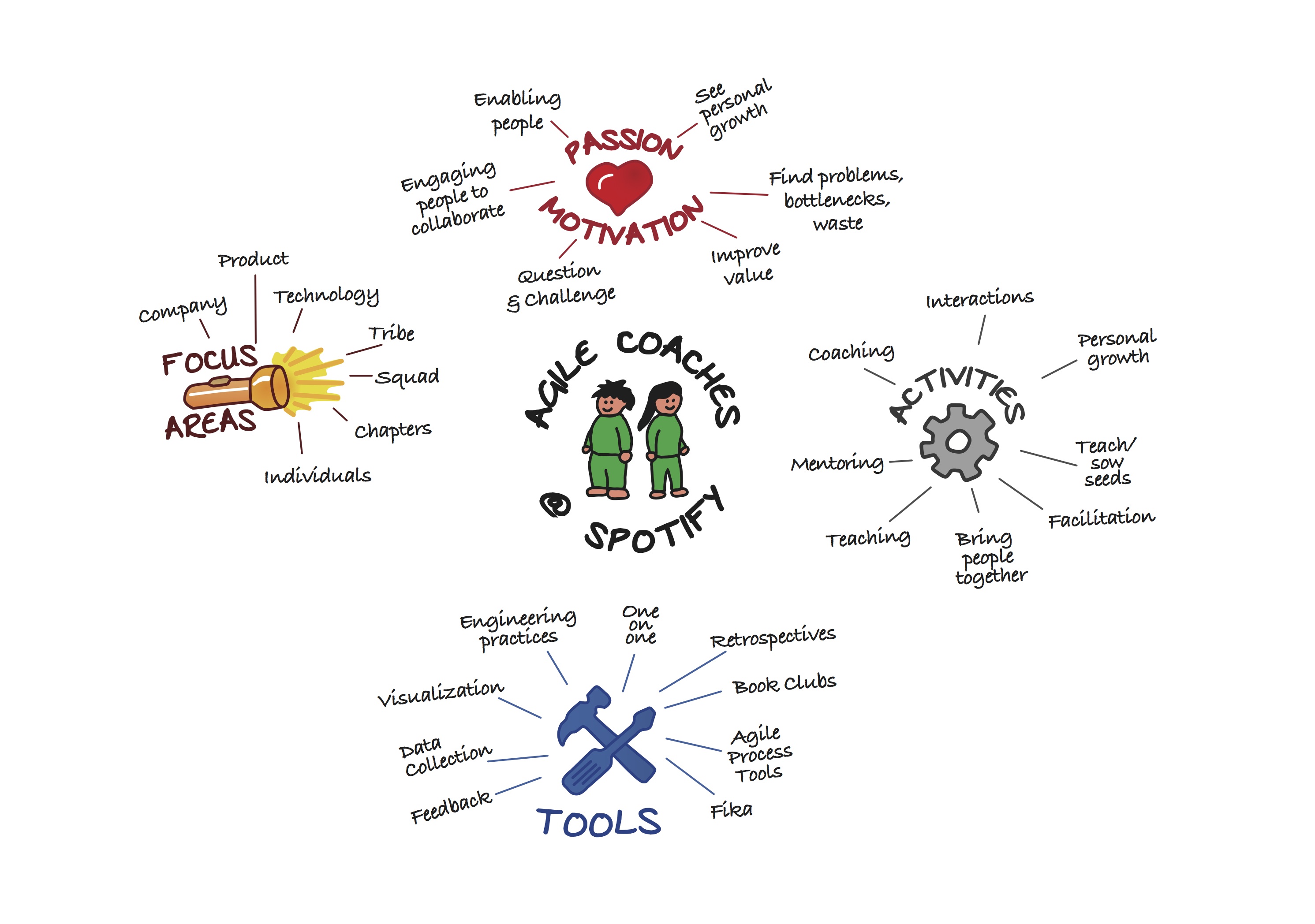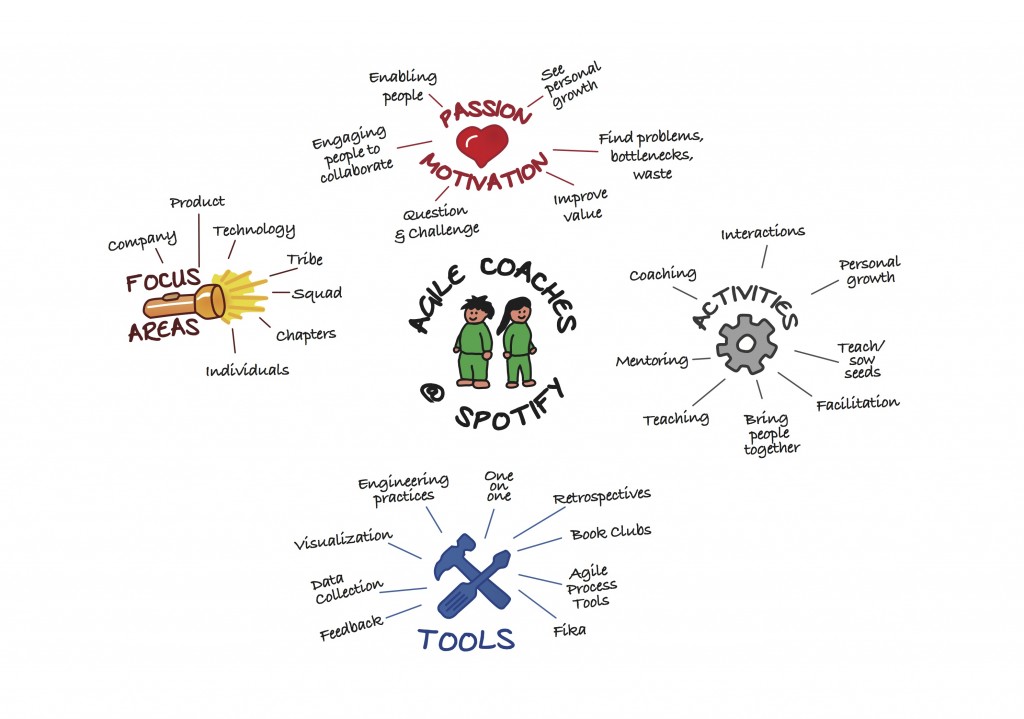The Agile Coach role at Spotify
“What does an agile coach do at Spotify?” This is a very common question when we host study tours in our office or when we speak at conferences. It is also a very good question because it makes us think about how we work and why we have chosen that way of working. I will try to answer all of these questions in a series of blog posts, starting with this one about the Agile Coach role and then publishing one blog post every day of this week, describing how I am actually spending my days as an agile coach at Spotify.
- Agile Coach at Spotify – Monday
- Agile Coach at Spotify – Tuesday
- Agile Coach at Spotify – Wednesday
- Agile Coach at Spotify – Thursday
- Agile Coach at Spotify – Friday (not published yet)
From Scrum Master to Agile Coach
When I joined Spotify in August 2011, my position was called “Scrum Master”. The job ad was pretty similar, if not identical, to what we now have published on our web site for the agile coach position. Except for “Agile Coach” instead of “Scrum Master” of course.
The Agile Coach role at Spotify is all about coaching and enabling the Development Teams. We are building an environment where continuous improvement of the development process is in focus and where everyone’s common goal is to deliver outstanding software as fast as possible while having fun.
As an Agile Coach at Spotify you are passionate about communication, group dynamics and coaching and you are not afraid to raise issues and drive change to remove impediments from your team. You’ll be working with a world-class team of engineers who love what they do – and we expect no less from you.
You should have an insatiable appetite for learning new things and improving existing ones. If you’re the right one for us, you pay attention to details and take great pride in your work.
What attracted me with this description and with the actual work I’m doing now (yes, they match!), is the mix of coaching teams and driving organizational change, honing my coaching and people skills and working as a mentor and change agent. Also, having worked as an “lean-agile expert” consultant with several (although not exclusively) short-term engagements, I longed for the opportunity of a long-term approach backed by strong management support for agile, lean and continuous improvement.
I was hired as the third Scrum Master/Agile Coach and at the time we had about 15-20 teams or so. Several of the teams were screaming for help with working more effectively together and we tried our best to help them. After a not so successful every-team-should-work-with-Scrum-and-do-exactly-like-it-says-in-the-book approach, the CTO had spearheaded an organizational design where autonomy was a, if not the, key principle and where the teams were considered “mini-startups” and Spotify an incubator for these. An important part of this autonomy was for each team to come up with a process that fit their specific context and their current needs.
While the de facto standard still was Scrum, several teams made adjustments to the text book approach and some of them experimented with what could better be described as kanban style processes. Our work as agile coaches was to assist the teams, through coaching and mentoring, in discovering improved ways of collaborating and developing into gelled high performing teams.
At the same time we, the agile coaches, studied Lyssa Adkins’s brilliant “Coaching Agile Teams” in our book club and we liked her distinction between a Scrum Master and an Agile Coach. Lyssa describes a Scrum Master as someone who “gets a team up and running with Scrum practices and agile principles”. An agile coach is:
-
Someone who appreciates the depths of agile practices and principles and can help teams appreciate them, too
-
Someone who has faced the big dragons, organizational impediments, and has become a coach to managers and other outsiders in the course of addressing them
-
Someone who can help management at all levels of the organization to understand the benefits of working agile
-
Someone who has brought the ideas from professional facilitation, coaching, conflict management, meditation, theater, and more, to help the team become a high-performance team – the way you always imagined a high-performance team could be when you allowed yourself to dream
Adding this influence, that matched what we were actually doing, to the fact that we were no longer (if ever) a “Scrum shop”, we decided to change the title of our roles to Agile Coach.
Team focus
So we don’t have Scrum Masters at Spotify anymore, but as a rule of thumb an agile coach is considered member of two teams that he or she is working with indefinitely. If the teams are new to agile practices and principles the coach will typically teach and facilitate stand-ups, planning and estimation, retrospectives, and so on, but pretty soon a lot of this will be handed over to the team members. Much like a Scrum Master, although usually not through teaching (or “implementing”) text book Scrum, but rather through helping the team decide what they need to improve and which practices to try out.
It is common for the coach to have regular coaching sessions with the individual team members, including the Product Owner, to help them on their agile journey, something that often goes on for a long time. By spending a lot of time with the teams we hope to grow a continuous improvement culture and to act as catalysts to speed up the team’s development into a high performing team.
Other agile coaches that we meet, at conferences and community events or in our recruitment process, are sometimes surprised by the amount of time we spend with the same team. They are used to go from team to team, perhaps even from organization to organization, to train teams, managers, Scrum Masters and product owners (rarely team members, at least not individually, it seems), maybe drive a change initiative or two, and then move on.
There are many reasons for our strong focus on teams at Spotify, probably at least as many reasons as there are coaches, but here’s a few of the ones I think are most important:
- In a world of autonomous squads a lot more work and decisions are being done in the teams compared to companies with more hierarchy.
- We have hired agile coaches who have experienced the power of high-performing teams first hand and who knows how effective they can be. We’re not content with average performing teams, we want to be pushing the limits.
- Spotify’s management knows this too and understands the importance of agile and coaching, that is, we have management support and we are not under staffed. Well, if my managers read this – we could always use a few more agile coaches of course! :)
- We grow fast. Extremely fast at times. 10x in the last 3 years. This means that even if we try to keep stable teams, new members are coming in all the time, teams are splitting into new teams, the organization changes, and so on, so we need to put in a lot of work to keep the teams performing in this fast-changing environment.
What’s next?
As with everything else at Spotify, the agile coach role is constantly evolving and changing. Back when I joined Spotify and we were only three coaches in one site, we were a small team working closely together to define our role and to decide what to look for in a new recruit. Today we are 15-20 coaches, working in three different sites and in several different departments (or “tribes” as we call them). With our emphasis on autonomy and independence there’s no wonder that the agile coach role is starting to look more and more different from tribe to tribe and from coach to coach. We are constantly experimenting with different approaches, trying different things with different teams. To share our experience and get some alignment, or at least a shared understanding of what our job is all about, we meet regularly to discuss what is happening and capture and develop the different aspects of our role.

One such meeting, a full day off-site, took place a few weeks ago at Yasuragi in Stockholm. In one of the Open Space(-ish) sessions some of the coaches produced this description of the agile coach role, beautifully illustrated by colleague Jimmy Janlén (and vectorized by Martin Wasielewski), which I guess represents our most current understanding of the topic.
At the moment we are experimenting with rating ourselves in the different areas of this poster, to understand where we want to improve, who can help us improve, and how and where to apply ourselves to be most effective in improving Spotify. But that’s a topic for another blog post.
This post has just scratched the surface of what the agile coach role is and I hope to further elaborate in future blog posts, starting with a series of daily posts describing the day-to-day work of one agile coach at Spotify – yours truly. If there’s anything else you want to know about agile coaching at Spotify or if you have something to share on the topic of the agile coach role, feel free to use the comments below.
29 Comments
Comments are closed.




[…] role at Spotify. If you haven’t done so already you may want to read the introductory post The Agile Coach role at Spotify […]
[…] role at Spotify. If you haven’t done so already you may want to read the introductory post The Agile Coach role at Spotify and the Monday post […]
[…] role at Spotify. If you haven’t done so already you may want to read the introductory post The Agile Coach role at Spotify and the earlier posts […]
[…] and went on to book venue, food, etc. There was also time for some blogging, soon to result in theintroductory post in this […]
[…] See on joakimsunden.com […]
[…] role at Spotify. If you haven’t done so already you may want to read the introductory post The Agile Coach role at Spotify and the earlier posts […]
Great post Joakim. I came across your blog while doing a search on Spotify and Agile. A good friend referred me to the organization during a discussion about companies that truly embrace Agile best practices.
As an Agile coach myself, it is always refreshing to hear about organizations that get it and are willing to go beyond the “Every team should work with Scrum and do exactly like it says in the book” mentality to implement best practices that aligns with their goals, values, and vision.
Kudos to you all and I look forward to future posts!
Nice post Joakim. As an agile coach at Net-A-Porter, it’s always interesting to hear stories from other large companies with many coaches. Give me a shout if you’re ever in London.
[…] role at Spotify. If you haven’t done so already you may want to read the introductory post The Agile Coach role at Spotify and the earlier posts […]
Hi Joakim, Im an Agile coach at TomTom in Amsterdam, NL and although its not a full time role here this was a very interesting read, I am actually really interested in setting up a visit to one of the Spotify Offices, I notice you have offices in Amsterdam and Belgium, do any of these offices do development? if so it would be fantastic to meet up with some people at Spotify and share experiences
Joakim, I’m still waiting to learn what you do on Fridays! :-)
I was scratching my head to find what should be my personal “one liner”. It’s clear. Am an “Agile Coach” ;)
To a large extend I do the mentioned points in this blog at a handful of company and I was not sure such roles exists globally. Thanks for this great blog post.
[…] Joakim Sunden shares an entire “daily series” on the role and life of the Agile Coach at Spotify – http://joakimsunden.com/2013/04/the-agile-coach-role-at-spotify/ […]
[…] A common question that I receive from the agile community is “What does an agile coach at Spotify actually do?” and about 2 years ago Joakim Sundén answered this question in his blogpost The agile coach role at Spotify. […]
Hi Joakim,
thanks a lot for sharing some insights on how the agile coach life is like in your company. Almost every part of this series promises some results to be published in fridays post – but unfortunately this was never published. Is it ever going to come?
Cheers,
Johannes
[…] the boundaries in the Scrum Guide? Is the role then still called “Scrum Master”? Joakim Sunden has written about how the Scrum Master role became the Agile Coach role at Spotify. They […]
Awesome article that distinguishes the journey from SM role to agile coach role and then summing it up with solidifying ideas within internal coaches network.
Hej. Mitt namn är Alexander Stangel och jag är nyfiken på att starta min utveckling mot att att bli en Agil Coach, jag vet inte riktigt var jag ska börja leta i internet djungeln och vänder mig därför till dig då jag snubblade över din hemsida.
Mina frågor är främst:
Hur börjar jag lättast
Vilka utbildningar är främst relevanta samt vilka priser bör jag vänta mig (finns det gratis även)?
Tack på förhand,
Alexander Stangel
[…] The Agile coach at Spotify […]
[…] kutipan langsung dari tulisan Joakim Sunden, seorang agile coach di […]
Hi!
Great work, so precise, detailed yet easy to follow.I’m all about making a positive difference in the life of another.
Thinking of taking an agile job to reach out and make a healthy change in the life of another. My friend advised me to look into this.
I’m not sure what an Agile Coach does, they have so many departments for self & health improvement.
Good luck and continued success.
Thank you for outlining your days as an agile coach! I am a newer coach (from a “traditional” SM) and am looking for ways to expand my role. I know this is 3ish years later, but still very useful for me.
Congrats to the team at Spotify …….. having read the article it is really impressive what you guys are doing. Wishing you continued, Cheers Maurice.
Ps. And a very Spotify customer
thanks for your experience at spotify company. I believe you had good fun and learning experience over there. what are steps(Types of training) we neeed to take a coach to train everyone to meet the common goal
Very encouraging to read this . Great to see that ‘Agile’ &’Scrum’ is not getting commoditized to the point that it begins to look like a ‘process’ but a continuous learning , discovery & adapting framework as a whole.
I am a fan of both the music platform & the Tribes/Scribes ethos. Good luck !!
Thank you for the article. I’m curious as to how you use the graphic that was created to show the value of a coach. I often get asked that question and would love to know how those things are measured.
Thanks!
Hi Beth, I’ve used it to communicate to the organization what an Agile Coach does and can help with. Spotify doesn’t really have a standard or structured way of measuring the value of coaching. A lot of work has been done lately to make the accountabilities more explicit and based on those I’d say the value is continuously assessed through observations, feedback and a continuous conversation between the Coach and their manager (often a Director of Engineering, Tribe Lead).
This is the accountability of the coach:
Agile Coaches are primarily accountable for driving the continuous improvement of team-based delivery of value.
Fundamentally this encompasses:
R&D works in ways that support delivery speed to value and align with Agile, Lean and Spotify values, principles, and practices.
Effective ways of working (processes, frameworks, tools, and behaviours) are spread across R&D.
Teams are continuously improving.
Teams are aware of and measure their performance (impact, delivery, health).
Leaders are supported to effectively deliver value at all levels of the organization.
I hope that helps.
Great article.
Who is the person that leads the meetings: Planning, Review, Retrospective, Daily’s, Refinement of the each team?
If the Agile Coach has many teams, he can not stay at all meetings.
It typically rotates in the team. The coach often models a good way of facilitating different meetings, teaches what the intended outcome is, some good practices, etc, and then give feedback when other people facilitate. Sometimes the PO, sometimes other individual contributors in the team. One pattern I saw used a lot, and encouraged myself, is to have a rotating lightweight “Scrum Master” role so everyone in the team starts taking ownership of meetings and engage in improvement of them.